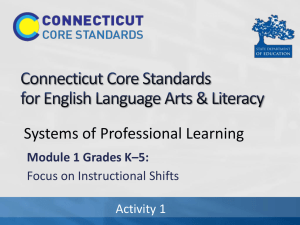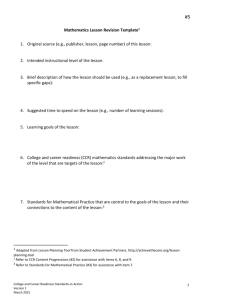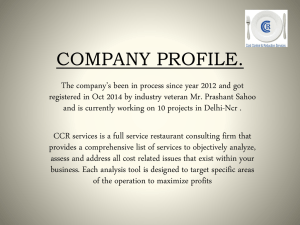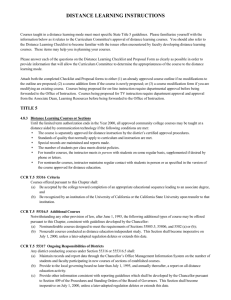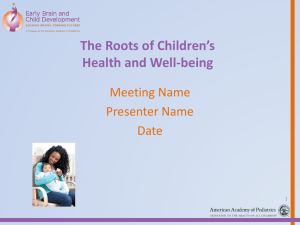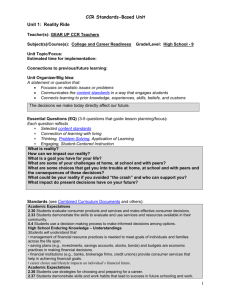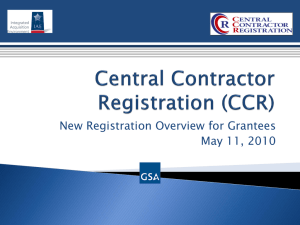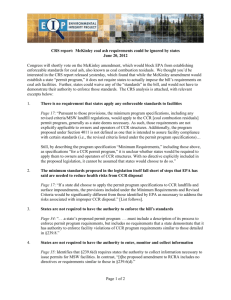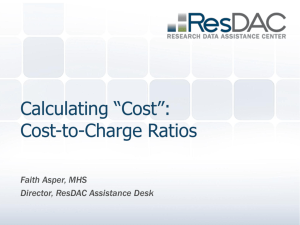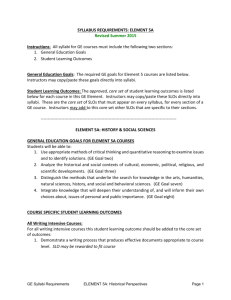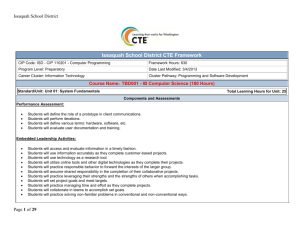Child Care Resource & Referral Agencies (CCR&R)
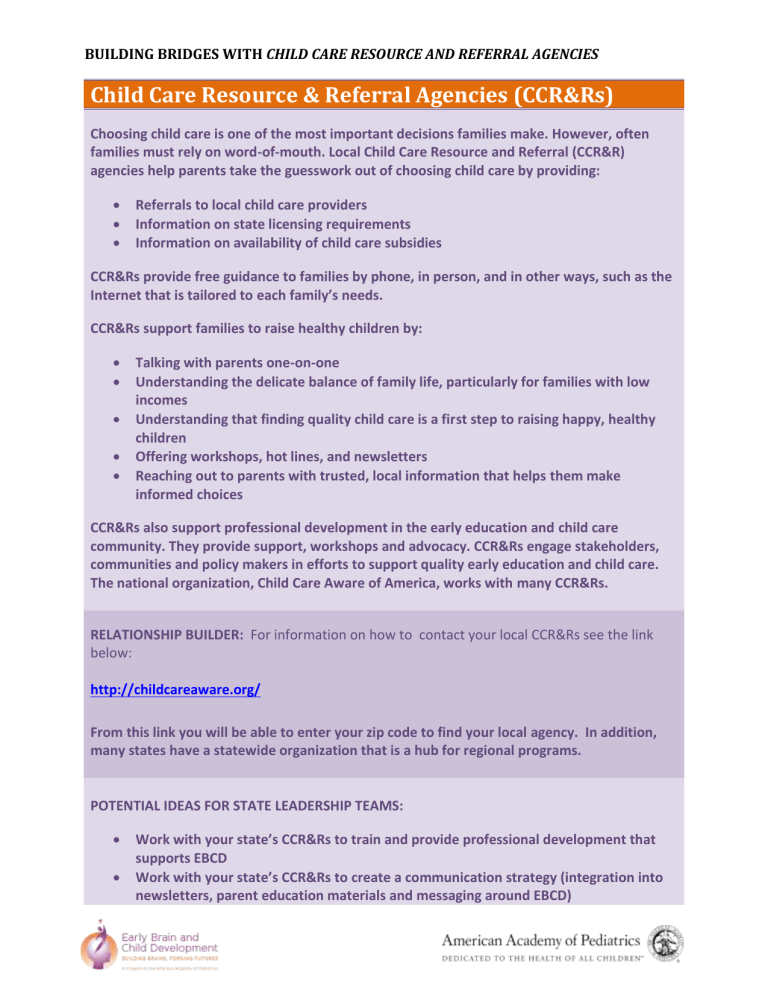
BUILDING BRIDGES WITH CHILD CARE RESOURCE AND REFERRAL AGENCIES
Child Care Resource & Referral Agencies (CCR&Rs)
Choosing child care is one of the most important decisions families make. However, often families must rely on word-of-mouth. Local Child Care Resource and Referral (CCR&R) agencies help parents take the guesswork out of choosing child care by providing:
Referrals to local child care providers
Information on state licensing requirements
Information on availability of child care subsidies
CCR&Rs provide free guidance to families by phone, in person, and in other ways, such as the
Internet that is tailored to each family’s needs.
CCR&Rs support families to raise healthy children by:
Talking with parents one-on-one
Understanding the delicate balance of family life, particularly for families with low incomes
Understanding that finding quality child care is a first step to raising happy, healthy children
Offering workshops, hot lines, and newsletters
Reaching out to parents with trusted, local information that helps them make informed choices
CCR&Rs also support professional development in the early education and child care community. They provide support, workshops and advocacy. CCR&Rs engage stakeholders, communities and policy makers in efforts to support quality early education and child care.
The national organization, Child Care Aware of America, works with many CCR&Rs.
RELATIONSHIP BUILDER: For information on how to contact your local CCR&Rs see the link below: http://childcareaware.org/
From this link you will be able to enter your zip code to find your local agency. In addition, many states have a statewide organization that is a hub for regional programs.
POTENTIAL IDEAS FOR STATE LEADERSHIP TEAMS:
Work with your state’s CCR&Rs to train and provide professional development that supports EBCD
Work with your state’s CCR&Rs to create a communication strategy (integration into newsletters, parent education materials and messaging around EBCD)
BUILDING BRIDGES WITH CHILD CARE RESOURCE AND REFERRAL AGENCIES
Work with your state’s CCR&Rs to generate an education and outreach plan that includes working with pediatricians. This could include increasing pediatricians’ awareness of quality early education and child care and increasing referrals to CCR&Rs
TOOLS:
1.
Sample outreach email to your CCR&Rs
2.
Sample E-blast for CCR&R newsletter
3.
Foundational PowerPoint
Sample outreach email to your CCR&Rs
Email Subject Heading: An Opportunity to Collaborate with Your AAP Chapter
Dear [insert name],
It is a pleasure to reach out to you as the Building Bridges State Early Brain and Child
Development (EBCD) Team Leaders (consisting of a member of our American Academy of
Pediatrics (AAP) Chapter and Early Childhood Systems Representative). As you may know, the
AAP has made EBCD a strategic priority. This is an incredible opportunity to ensure that children are supported early with nurturing environment and relationships that promote health and success.
We are interested in exploring how we can work together to incorporate EBCD efforts into the work of our state’s CCR&Rs. In this regard, we would like to plan a meeting or a call to identify collaborative efforts and opportunities.
Below are the days and times we are available during the next 2 weeks for your consideration.
[insert dates and times]
If you have any questions, please let us know. We are looking forward to speaking with you and exploring ways that we can work together.
Sincerely,
Names
Contact Information
BUILDING BRIDGES WITH CHILD CARE RESOURCE AND REFERRAL AGENCIES
Sample E-blast for CCR&R newsletter
Article title: CCR&R Role in Early Brain and Child Development
The American Academy of Pediatrics has made Early Brain and Child Development (EBCD) an important strategic priority. This is because child development is the basis for lifelong health, community and economic development.
Brains are built over time, from before birth to young adulthood. They grow in a bottom up manner. This means that a solid foundation is needed for future skills and success. We also know many risk factors can disrupt healthy development, especially toxic stress. Toxic stress can occur when a child experiences strong, frequent, and/or prolonged adversity (e.g., physical or emotional abuse, chronic neglect, caregiver substance abuse or mental illness, exposure to violence, and/or the accumulated burdens of family economic hardship) without adequate adult support.
Toxic stress disrupts the developing brain and has lifelong effects on learning, behavior and health.
Additionally, we know that positive support can build healthy futures. This positive support includes safe, positive relationships with caregivers, quality early education and child care programs, positive parenting, and nurturing emerging social, emotional, and language skills.
Supports like these can buffer toxic stress and build resilience by promoting healthy, adaptive coping skills.
Early education and child care providers are in a unique position to support children’s healthy development in their daily work by:
Helping children develop friendship skills
Teaching children to understand their emotions
Helping children to learn to control their anger and impulses
Modeling problem solving
Providers have opportunities to screen children and families early and to support them with community referrals, when needed. This includes improving communication and coordination with the child’s medical home.
We encourage you to reach out to your local American Academy of Pediatrics Chapter which is here to offer support and education about early brain and child development.
[Add contact information]
